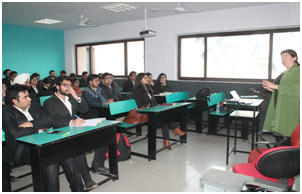Shiv Manjaree
Assistant Professor
Department of Mechanical Engineering
THE NORTHCAP UNIVERSITY, Gurgaon
‘Engineering’ is defined as the application of mathematical and scientific concepts to finally get a user-friendly system through various innovations, ideas, design, manufacturing etc. The various branches of Engineering are Mechanical Engineering, Electrical Engineering, Electronics and Telecommunication Engineering, Civil Engineering, Computer Science Engineering, Information Technology and other multi-disciplinary areas. It’s a professional programme and helps in the expansion of analytical thinking and logical thinking, but,‘Why do students joining College/University still find Engineering as a first and preferred career choice?’ The answer to this question can only come by introspection towards the mindset of passing out school students, their parents and the society perspectives which play a major role in their career choice. Past trend shows that professional programmes are the major career choices for any aspiring student. The passing out school students (better termed as ‘freshers’) still want to be either doctors or engineers as a first choice.One of the important factors is that in India the decision of a student’s career choice is shaped in most of the cases by his/her parents. Some of the various other key reasons impacting forthe selection of ‘Engineering’ as a preferred career choice are possibly:
1. In the present Indian scenario with the concept of ‘Make In India’, ‘Engineering’ will definitely rebound as a preferred choice for our youngsters. This campaign actually focusses on the development of both industrial and infrastructural requirements of India. In other words, technical minds and technical skills are needed at large to meet national goals in coming years. This point also opens up the way for the overall growth (in terms of high salaries and status in society) of middle class families who aspire their children to train as engineers.
2. In last few decades, India has witnessed the Information Technology boom leading to the formation of IT Parks in major cities. This has also directly helped our youngsters to retain ‘Engineering’ as their preferred career choice as it has led to more employability and financial stability.
3. ‘Engineering’ acts as a launch pad and provides flexibility to various higher studies in different fields such as M Tech, MS, MBA or Civil Services and other programmes either from India or abroad.
4. Opening up of large number of Engineering based Educational Institutions have also played an important role in decision making for ‘Engineering’ as a preferred career choice even for lower merit students, who see a good future for themselves.
However, in the last few years, it has been seen that many students opt for courses other than Engineering as a plethora of options are open to them. Having said so, ‘Engineering’ still remains the prevailing and preferred career choice by a vast majority of Indian students.











